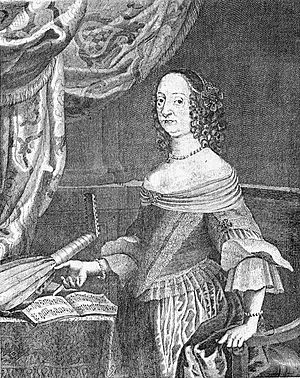Duchess Elisabeth Sophie of Mecklenburg facts for kids
Quick facts for kids
Elisabeth Sophie of Mecklenburg
|
|
|---|---|
 |
|
| Born | 20 August 1613 Güstrow |
| Died | 12 July 1676 (aged 62) |
| Noble family | House of Mecklenburg |
| Spouse(s) | Augustus the Younger, Duke of Brunswick-Wolfenbüttel |
| Issue | Ferdinand Albert I Marie Elisabeth |
| Father | John Albert II, Duke of Mecklenburg |
| Mother | Margaret Elisabeth of Mecklenburg |
Elisabeth Sophie of Mecklenburg was a talented German noblewoman who lived from 1613 to 1676. She was known for being a poet, a composer (someone who writes music), and an impresario (someone who organizes big shows and events). She later became the Duchess of Brunswick-Lüneburg.
Contents
Early Life and Musical Training
Elisabeth Sophie was born on August 20, 1613. She began her music studies at the court of her father, Duke John Albert II of Mecklenburg-Güstrow. His court had a famous orchestra that included many skilled English musicians, like William Brade.
In 1628, a big war called the Thirty Years' War threatened her home. Because of this, Elisabeth Sophie moved to the court of Kassel. This court also had a very strong tradition of music, which helped her continue her studies.
Marriage and Family
In 1635, Elisabeth Sophie married Augustus the Younger, Duke of Brunswick-Lüneburg. He was a very educated man. Together, they had two children:
- Ferdinand Albert I, Duke of Brunswick-Lüneburg
- Marie Elisabeth of Brunswick-Wolfenbüttel
Her stepdaughter was Sibylle Ursula von Braunschweig-Lüneburg.
Musical Career and Compositions
Elisabeth Sophie was given an important job: she was in charge of organizing the court orchestra. She often worked closely with Heinrich Schütz, a famous composer who was appointed absentes Kapellmeister (a lead musician or conductor) in 1655. Some people believe she even helped him write parts of his musical work called Theatralische neue Vorstellung von der Maria Magdalena.
Most of Elisabeth Sophie's own music was made up of hymns (religious songs) or devotional arias (songs for worship). Some of her compositions were published in 1651 and 1667. The music printed in 1651, called Vinetum evangelicum, Evangelischer Weinberg, is thought to be the very first music ever published by a woman in Germany!
Organizing Court Entertainments
Besides composing, Elisabeth Sophie played a huge role in creating large and exciting court entertainments. These included:
- Masquerades: Parties where people wore masks and costumes.
- Plays: Theatrical performances.
- Ballets: Dance performances.
She sometimes wrote the librettos (the words or story for an opera or musical work) and the music for these shows. We know of two of her dramatic works that still exist today: Friedens Sieg (meaning "Victory of Peace"), which was performed in Brunswick in 1642, and Glückwünschende Freudensdarstellung (meaning "Joyful Presentation of Good Wishes"), performed in Lüneburg in 1652.
See also
 In Spanish: Isabel Sofía de Mecklemburgo para niños
In Spanish: Isabel Sofía de Mecklemburgo para niños
 | Toni Morrison |
 | Barack Obama |
 | Martin Luther King Jr. |
 | Ralph Bunche |

